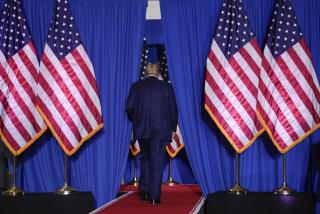Are We Dumb or Just Numb?
Forget truth. That is the message from our government and its apologists in the media who insist that the Iraq invasion is a great success story even though it was based on a lie.
In the statement broadcast to the Iraqi people after the invasion was launched, President Bush stated: “The goals of our coalition are clear and limited. We will end a brutal regime, whose aggression and weapons of mass destruction make it a unique threat to the world.” To which Tony Blair added: “We did not want this war. But in refusing to give up his weapons of mass destruction, Saddam gave us no choice but to act.”
That claim of urgency -- requiring us to short-circuit the U.N. weapons inspectors -- has proved to be a whopper of a falsehood. Late Sunday, the U.S. Army conceded that what had been reported as its only significant WMD find -- two mobile chemical labs and a dozen 55-gallon drums of chemicals -- “showed no positive hits at all” for chemical weapons.
But we now live easily with lies. “As far as I’m concerned, we do not need to find any weapons of mass destruction to justify this war,” writes Thomas L. Friedman in the New York Times. The pro-administration rationalization holds that the noble end of toppling one of the world’s nastier dictators -- assuming that the Iraqi people end up freer and not ensnared in an Iranian-type theocracy -- justifies the ignoble means of lying to the world. Or, as Friedman puts it, “Mr. Bush doesn’t owe the world any explanation for missing chemical weapons (even if it turns out that the White House hyped this issue.)”
Hyping? Is that how we are now to rationalize the ever more obvious truth that the American people and their elected representatives in Congress were deliberately deceived by the president as to the imminent threat that Iraq posed to our security? Is this popular acceptance of such massive deceit exemplary of the representative democracy we are so aggressively exporting, nay imposing, on the world?
It is expected that despots can force the blind allegiance of their people to falsehoods. But it is frightening in the extreme when lying matters not at all to a free people. The only plausible explanation is that the tragedy of Sept. 11 so traumatized us that we are no longer capable of the outrage expected of a patently deceived citizenry. The case for connecting Saddam Hussein with that tragedy is increasingly revealed as false, but it seems to matter not to a populace numbed by incessant government propaganda.
The only significant link between Al Qaeda and Hussein centered on the Ansar al Islam bases in the Kurdish area outside of Hussein’s control. That’s the “poison factory” offered by Colin Powell in his U.N. speech to connect Hussein with international terror. But an exhaustive investigation by the Los Angeles Times of witnesses and material found in the area “produced no strong evidence of connections to Baghdad and indicated that Ansar was not a sophisticated terrorist organization.” Moreover, the purpose of this camp was to foster a holy war of religious fanatics who branded Hussein as “an infidel tyrant” and refused to fight under the “infidel flag” of his hated secular regime.
The embarrassingly secular nature of the government was summarized in another Los Angeles Times story on the status of women: “For decades, Iraqi women -- at least those living in Baghdad and some other big cities -- have enjoyed a degree of personal liberty undreamed of by women in neighboring nations such as Saudi Arabia and the Persian Gulf emirates.”
Those freedoms -- to drive, study in coeducational colleges and to advance in the professions -- are now threatened by the fundamentalist forces unleashed by the invasion. The former U.S. general now governing Iraq has stated that he will not accept a reversal of those freedoms, but our long history of cozy relationships with the oppressive Gulf regimes can’t be reassuring to Iraq’s women.
Such issues would be less compelling had the claim that Iraq’s weapons of mass destruction posed an imminent security threat to the U.S. proved true. Our goal, the destruction of those weapons, would then have been clear, and once that goal was accomplished, an expeditious U.S. withdrawal would have been justified.
But in the absence of such a threat, the U.S. role in Iraq becomes inevitably stickier. For “Operation Iraqi Freedom” to be more than a catchy propaganda slogan assumes an enduring obligation to provide the content of freedom to the Iraqi people that Americans claim to believe in. It is hoped that will include the election of a leader who tells the truth.
More to Read
Sign up for Essential California
The most important California stories and recommendations in your inbox every morning.
You may occasionally receive promotional content from the Los Angeles Times.










